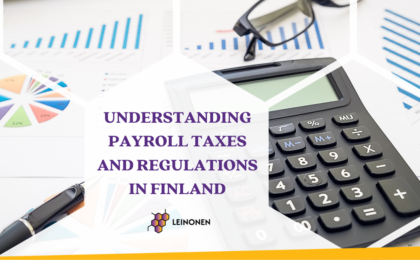Company accommodation – as classified by the Finnish Tax Administration (FTA) – is considered a fringe benefit, if the taxpayer is enabled to use the company-owned apartment based on his/her employment. The apartment must be either owned or sublet by the employer. The fringe benefit value of the accommodation is comprised of a fixed, base value, and a sum relevant to the size of the apartment. Location is also an important factor when determining the fringe benefit value: FTA hands out a yearly report in which they divide Finland into six zones, each with different fixed benefit prices for the apartment itself and the added price per square meter value. The zone divide is based on statistics on rent prices released by Statistics Finland to make sure that the fringe benefit stays on par with actual rent prices in the relative area. Read the precise amounts on our previous post.
As a fringe benefit, company accommodation affects the taxpayer’s income. Of course, the employee may deduct rent costs collected by the employer in his/her taxes, but the fringe benefit increases the amount of gross income earned, and thus also the total amount of taxes paid. Company accommodation may be beneficial when the extra income it brings doesn’t raise the tax rate into a higher level of tax progression, if the fringe benefit is paid on top of his/her wage.
Company accommodation may also be beneficial to the employee when the apartment used has a lower fringe benefit value than the general level of rent in the area, if the fringe benefit is included in his/her wage. For example, many municipalities close to the capital city region in Finland are not classified as “surrounding municipalities”, but they may have high rent rates nonetheless due to the proximity to the capital city region. If the company accommodation is located in a municipal that FTA classifies as “the rest of Finland”, their fringe benefit values are lower, creating a considerable difference between the fringe benefit value and the actual rent value.
Company accommodation may be even more beneficial for the employer. Though accommodation is considered a taxable income, its fringe benefit value determines the true amount of taxable income. This means that the difference between the accommodation’s fringe benefit value and true rent value is tax-exempt income. As it is tax-exempt income, the employer isn’t required to pay pension insurance fees or other social security expenses for the difference.
Read more on fringe benefits from the Finnish Tax Administration.



